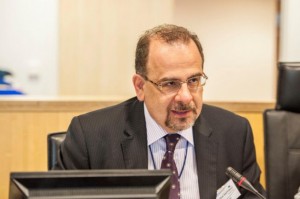“Crucially, the green and circular economies have a key role to play in job creation, skills development, poverty reduction and in a new model for economic competitiveness and growth. This is the model for our future, it is non-negotiable”. Luca Jahier, president of the group “Various interest” (farmers, consumers, environmentalists, family associations, NGOs etc.) of the European Economic and Social Committee, a consultative body of the European institutions, explains in this interview granted to Eunews view of the two-day discussion on green growth that will take place in Bruxells five and 6 May.
Green and circular economy are part of a crucial development project promoted by the Union, which is trying to shake off the crisis it had to suffer. It is hence not just a matter of environmental protection. From your privileged perspective, could you tell us if these kinds of economy have the potential required to give a decisive push towards recovery?
Both the green economy and the circular economy strive for a sustainable, equitable, holistic development, where economic growth is not the only measure of progress. The transition to the green economy is an integral part of this process and an opportunity to create new economic models based less on raw material imports and increasingly volatile prices. In contrast, it will be based more on the respect for the environment, resource efficiency and social equity. However, this new economic model will only be achieved by coordinated political action from all actors, technological improvements, changes to energy, industrial, agricultural policies, and modifications to the behaviour of both producers and consumers. Crucially, the green and circular economies have a key role to play in job creation, skills development, poverty reduction, in the provision of decent work and in a new model for economic competitiveness and growth. This is the model for our future, it is non-negotiable, it has repercussions on a myriad of dimensions of our lives and needs to be addressed urgently, ambitiously and coherently. We now need to make a leap of faith for our sustainable future.
The role of citizens, the role each of us play, is crucial for the development of “green” practices. In your opinion, is the European civil society ready to play its part, both with daily gestures and with the support for political choices aiming at a ‘greener’ system?
There is no doubt that the effective implementation of a global sustainable development strategy, including the development of the green economy, will only be possible when political leaders are subject to pressure from below. To design and launch a green economy in Europe, we need partnerships, the exchange of good practices, transparency, accountability and active participation. Hence, citizens, grassroots initiatives, organised civil society, local projects and communities have a central role to play in moving the agenda forward, in raising awareness, in helping to overcome public fears on sustainable economies and in motivating other citizens to become actively involved. Throughout Europe, it is precisely the small-scale local projects which will incentivise local public authorities and provide local solutions to local problems. Let us also not forget that civil society and grassroots actors are by their very nature very creative, dynamic, highly motivated and flexible. As a consequence the solutions that they will propose to green our economy, will be innovative. Let us hope that they will also learn from the social economy, which has a long experience in building sustainable enterprise models with social and environmental objectives.

The European Union, and the Commission in particular, always seems entangled between the push for a more serious battle against climate change and the defense of corporate interests. Do you think the Union is doing enough? Is something is missing, should the Union be braver?
Over the last few years, the EU has made energy efficiency and combatting climate change into priorities. The EU has taken the leadership, driving a difficult process. The negotiations on the EU’s 2030 climate change and energy package, which was effectively a Conference of Parties (COP) at the EU level, have demonstrated that it is extremely difficult to implement what the COP strives to do, i.e. to establish clear national responsibilities. For this reason, certainly at the global level, it is imperative that trust is rebuilt and that in both the negotiations and the policy outcomes there is a clear understanding of the purposes of establishing an ambition climate protection policy. This is not to gain economic advantages over other countries or sectors, but to ensure the sustainability of our climate system which is common to all of us. Ultimately, the cost of prevention will be far less today than making reparations in the future. The EC has a pivotal role in this process, but so do also national governments as EU co-legislators with a considerable power of persuasion over private sector industries operating in their countries. In this sense, Member States can encourage innovative industries to develop, by introducing favourable regulatory environments and financial incentives. The EU does have courage, now all actors need to be marching in the same direction!












